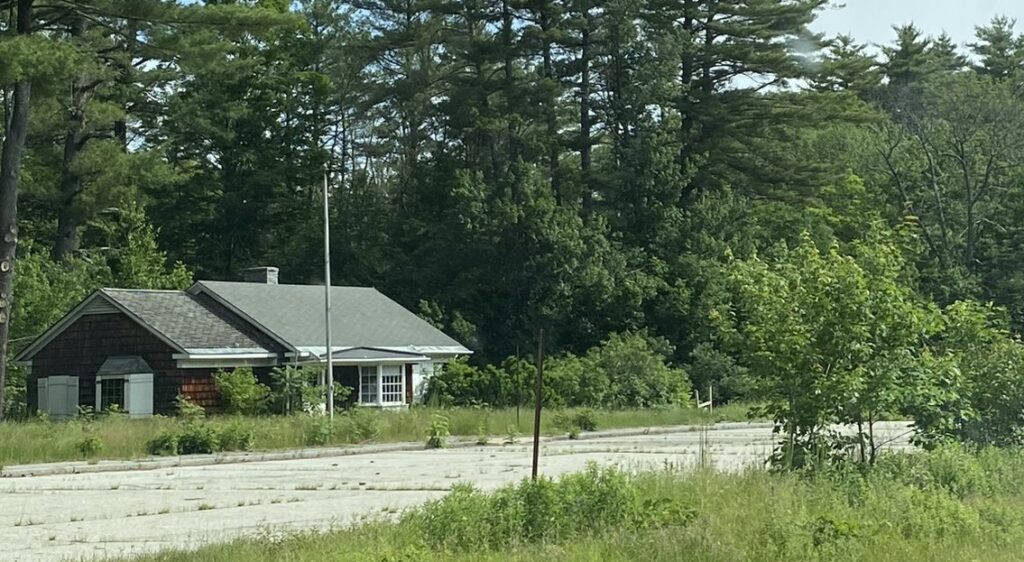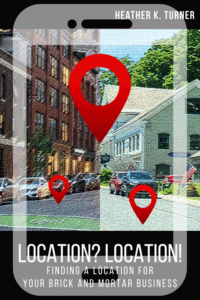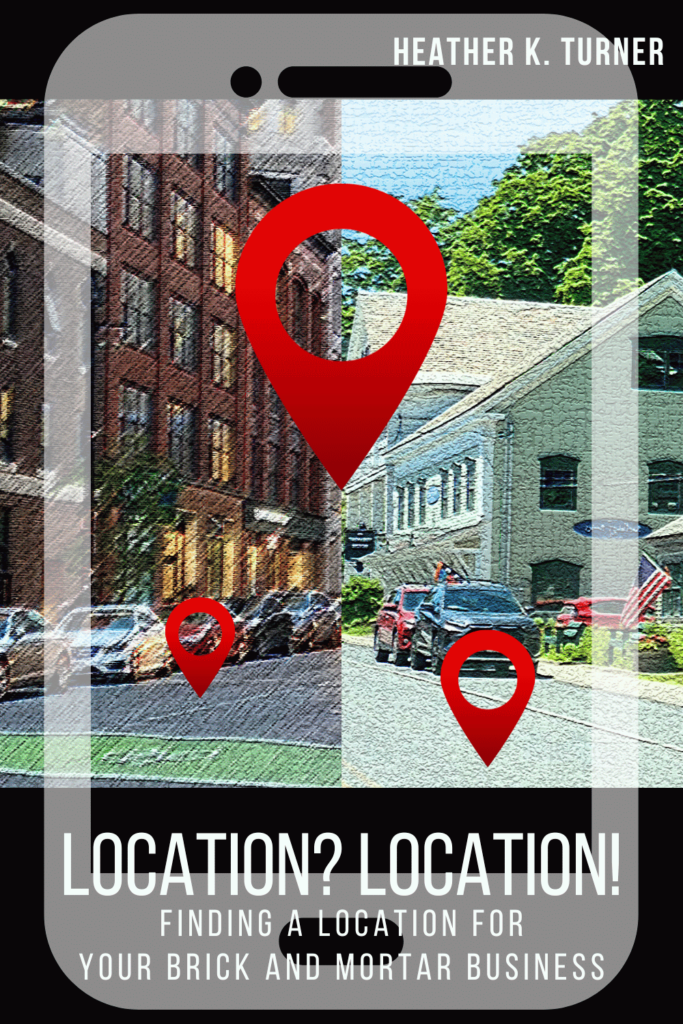by Heather T. | May 7, 2025 | Blog, Books, Business Location
 This is Chapter Eleven from my book, Location? Location! Finding a Location for Your Brick and Mortar Business. How to Scout the Perfect Location for Your Dream of Opening a Brick and Mortar Business.
This is Chapter Eleven from my book, Location? Location! Finding a Location for Your Brick and Mortar Business. How to Scout the Perfect Location for Your Dream of Opening a Brick and Mortar Business.
Lot Conditions can factor heavily into additional costs, and also inconvenience for an owner buying a new building or property plot if not considered prior to purchase and typically buyers don’t give a lot of thought to a parking lot unless it’s in very bad shape to start with.
Does the property you have found have a parking lot? Is it just for your business, or is it shared with an adjacent business? What is its condition? Paved? Gravel? Dirt? Something else?
If you are buying a location, is the parking lot going to need work? How much is it going to cost to repave or regrade? Does the lot slope towards your building? Or away? If it’s a gravel or dirt parking lot, how much and how often will it need fill or leveling?
Are you in an area with a lot of rain that may affect your lot’s condition? Or is it at the bottom of a hill or mountain that may have an excessive amount of melting snow/runoff in the spring?
When I worked in Vermont during the spring, the parking lots at the Ski Resort I worked at would frequently get flooded. The resort was open for business year-round and we would get some extremely grumpy customers complaining about navigating partially flooded parking lots.
If you are leasing the property, does the landlord have a history of maintaining the lot? If it needs maintenance to bring it up to acceptable use levels, is the landlord going to pay for that? And who defines “acceptable?” Make sure you get a written agreement from the landlord, and before signing anything, have a good business lawyer look over that agreement.
Why should you care about the condition of the parking area? A business with a well-maintained level of paved surface will look much more attractive to a passerby than a lot filled with enormous cracks, missing chunks of pavement, and grass tufts scattered throughout it.
Even more critical than curb appeal, the condition of the lot can impact a car driving through it (think potholes) and the walk from your lot to your business are important factors in the safety and well-being of your customers, as well as their vehicles.
If you don’t have parking on site and only street parking, paid lots, or a parking garage parking nearby, what shape are they in? Paid lots can discourage visitors if they are not in very good shape, as can parking garages. If your customers or staff are leaving late in the evening or arriving early in the morning, how safe are these locations? Are they well lit? Guarded? These factors all play into how comfortable people will be patronizing your brick and mortar business.
What are roads like locally? Are they well maintained? What condition are they in after a long winter? Are there lots of frost heaves that the town doesn’t pay attention to or massive potholes that it seems to take forever for the town or city to repair? Do the plows do a good job? And are they timely about getting out and clearing passage in regular snowstorms?
You won’t know if you are looking at the property in the spring, summer or fall, but this is where talking to residents and local businesses can help you fill in those holes in your knowledge base.
Consideration points for this chapter.
If there is a parking lot:
How many spaces do you have for the facility?
How many ADA/handicapped spaces do you have?
Are they well marked on the pavement, and via signage?
What condition is the parking lot in?
Is there also going to be enough parking for your employees?
Yes No
If No, where are they going to park?
How much is plowing going to cost in a bad winter? Don’t take average costs per winter. Base your budget on the worst winter you can get information on.
What other maintenance and repair needs are required for the lot?
What kind of shape is the lot in? Does it need a redesign and/or need work soon? If so, budget for it now.
Are there spaces set aside for pickup/delivery only? (if applicable)
Yes No
And if not, is there room to set aside and designate a few spaces for them?
Yes No
How is the lot laid out? Is the traffic flow with-in the lot easy to navigate or will people with oversized vehicles have trouble navigating the lot or pulling into or out of spaces?
Are there spaces for motorcycle parking? And if not, is there room to set aside or designate a few spaces for them? If you potentially have customers that may come in on bikes, you may want to consider this.
Yes No
Notes:
by Heather T. | Mar 11, 2025 | Business, Business Location, Observations, Operations

In Chapter 13 of my location assessment book I talk about foot traffic. I’d like to dive in a little bit more on foot traffic and using hair salons is a perfect example of this. If you are in a more rural area, your traffic is primarily going to be dependent on people making appointments and driving anywhere from a short distance to a long distance away rather than foot traffic. In this case how (website, social media, print ads, online ads, networking, etc.) and where you advertise (where is the competition advertising?) as well as making sure your pricing is in line with area competitors is going to be key.
If you are in a more urban area and even more densely populated one like New York City you’re going to have different types of foot traffic. I am going to include some types of public transportation as foot traffic because unless you have a subway or bus stop right in front of your salon, there is still typically some walking. There are walkers that are passersby, typically a very small percentage that are going to be impulse walk-ins, although a barber shop may have a higher percentage, and clients who walk from their homes or businesses.
For example, you might have someone that lives within two to five blocks of your salon walk to it, or they might take a bus, subway or elevated train depending on where you are. Your clients with a more disposable income might be coming from a similar distance away but they may prefer to take a cab or have a driver drive them.
Your clientele might be primarily men, or primarily women or could be a mix, or families. Are they clients that are looking for a quick serve in and out for a 20 minute wash, cut and blow dry, or is it a two hour experience? Is your clientele single professional people with more money to spend on an appointment? Are you close to residential neighborhoods and if you are, what types of neighborhoods are they? Are you more in the heart of a financial, business or shopping district? And again, who are the types of people that might come and either work in the area or shop in the area? How much time do they have on their hands and importantly when? Lunchtime? Prior to work? After work? It might be a combination of some or all of those, but it’s important to think about how they will come to you if you’re in a city or more urban area that may not have a lot of parking or limited parking.
Doing this assessment preopening a location can help dictate what hours you are going to be open and what you offer. If you are catering specifically to families with kids, with kids in addition to parents being clientele, evenings and weekends will typically be busier except during school breaks and the summer months, so plan accordingly.
What services do you think they’re willing to pay for, as well as what are the competitors offering, plus what are the competitors charging? And I say “think” for a reason. Do your research first, ask questions of residents and do the competition stalking because if you just assume that moving into a salon that offers services to a demographic that doesn’t want, can’t pay for, or does not have time to take advantage of, turns the word assume into any of your choice of applicable acronyms.
- Avoiding Serious Study Undermines Market Entry
- A Strategy Sorely Underestimated Means Exit
- Analysis Shortcuts Sink Unprepared Market Entrants
- A Stupid Strategy Usually Means Exit
- A Startup Stumbles Unless Market Examined
- Avoiding Smart Steps Undermines Money & Effort
- A Strategy Sans Understanding Means Exiting
- Avoiding Study Secures Unnecessary Mistakes & Errors
Three additional things to think about when opening a salon, whether you are building from scratch, revamping an existing space (occupied formerly by another type of business) or taking over an open (or recently closed but existing salon).
Just because an existing salon has been operating in the space doesn’t mean you don’t still need to evaluate these things. If a space offers four salon chairs and you plan to add two additional chairs into the space, you will need to find out whether you will have the plumbing capacity to handle additional high-water usage and have proper drainage. A new or renovated space needs to have sufficient plumbing to handle multiple shampoo stations. Most standard retail spaces often lack the proper pipe capacity, hot water heating capability and may have potential drainage issues.
Another consideration is ensuring the space has proper ventilation for the strong chemicals and styling sprays used commonly by salons. Having sufficient HVAC capacity is critical to prevent fumes from building up.
The third consideration is that the electrical system must be able to support multiple high-wattage appliances running simultaneously. I spoke with a business owner last year who renovated an existing space that was formerly a retail store (not a existing salon), and had to spend over 25K to upgrade the current electrical system between upgrading the existing electrical panel, new wiring and dedicated circuits and labor costs. So it’s worth evaluating (and getting several cost estimates) if you are renovating or expanding a place you are renting or planning on purchasing beforehand.
Action items:
Who is the competition?
What is their pricing?
What do they offer?
Where and how do they advertise? (Offline and Online)
Can the area of region support another salon/hair stylist? Or is there already market saturation?
Who (specifically is your target market(s)?
What services are they looking for? (don’t assume: ask, research, poll, do surveys)
Does the location have adequate water and drainage?
Is there adequate HVAC needs for the space?
Is there adequate electrical capability for the space?
For additional touchpoints and topics on evaluating a space for your salon, please check out Finding a Location for Your Brick and Mortar Business
by Heather T. | Jan 21, 2025 | Business, Business Location, Observations, Operations
 Taking a brief break from the questions for a day on brokers as like many writers, I’ve been lax about self promotion, and quite honestly suffering a bit from imposter syndrome. A dyslexic that’s a book writer? Yikes! My 10th grade English teacher is probably rolling in his grave right now.
Taking a brief break from the questions for a day on brokers as like many writers, I’ve been lax about self promotion, and quite honestly suffering a bit from imposter syndrome. A dyslexic that’s a book writer? Yikes! My 10th grade English teacher is probably rolling in his grave right now.
Ah, the wonders of help like Grammarly and ProWritingAid plus a wonderful editor. Today’s inspiring conversation with a friend has helped to motivate me to pursue self-promotion a bit, trying to strike a happy medium between effective marketing and avoiding annoyance. I’ve never really had the need to self promote, although I do a killer elevator pitch/30 second commercial, so off we go………
This is Chapter Three from my book, Location? Location! Finding a Location for Your Brick and Mortar Business. How to Scout the Perfect Location for Your Dream of Opening a Brick and Mortar Business.
Wants Based VS Needs Based Businesses
One of the biggest questions that new businesses fail to ask is NOT whether there is an opportunity for a business in this location, but WHY isn’t there one or more businesses already located here?
Some questions to ask yourself before even going location hunting.
- Is this a new type of business?
- A new industry offering?
- Has someone already established it as a tried-and-true business type?
- Is this a fad that in two years, or five years, or more (or even less), could be irrelevant?
There is a long history of product launch failures, including two major soda brands with new products that didn’t fly; for example, the Arch Deluxe from McDonald’s, (upon which they spent millions of advertising dollars); Microsoft Zune among others. Those are product examples, but what about services, or service and products?
Think about how much times have changed. When I was a teenager, arcades were “in”. Now they are few and far between due to the rise of at home gaming systems.
What about video rental stores? Blockbuster didn’t move with the times to digital like Netflix did. RadioShack couldn’t end up competing with Amazon and Walmart. Borders Bookstores is another one that didn’t change with the times, but Barnes and Noble did, and they are still around.
While opening a coffee shop or clothing store will probably still be relevant in ten years, will a spa offering isolation/float tanks? Or a studio with custom backdrops, green screens and props so people can record more professional looking TikTok videos? Will TikTok even exist in 5 years (or next week)? If you buy into a franchise, what happens if the franchise goes under?
While there is no crystal ball to predict what can happen, map out several ‘worst case’ scenarios, and have a plan for what you might need to do before renting or buying a space. If you are a home-based business doing subscription boxes, the interest may trend for a few more years, but your business is at home and your overhead costs are minimal. If you are laying out money for a lease or mortgage, just so you can have space to package up boxes, can you tell yourself that this business is definitely going to be relevant a few years from now? If you’re not, I’d say, don’t NOT rent the space, but be prepared to pivot if consumer interest wanes.
Another question to ask yourself is WHY isn’t there already a business in the area in your niche industry? In many cases it’s because someone started one there and it failed because there wasn’t enough need for it, or the community couldn’t support it. Make sure you do your homework first. Google remembers everything and so do the locals. Ask around and do some online searches for the area.
An example here in New Hampshire was a small gym that opened up about 15 years ago. They spent a lot of money on the building and equipment and they limped along for about 3 years with very low membership. One of the top reasons they failed was they priced their membership too high for what they were offering. The second reason was they didn’t assess the community, which wasn’t really looking for a gym that offered little in the way of workout equipment in the first place. If they had built the building larger and put in a pool and asked the community what they were looking for in terms of equipment and other offerings, they might still be open. If they had lowered their rates significantly, they “might” have made it, but they were trying to recoup all of their startup costs as quickly as possible, and priced themselves out of the limited market they had to start with.
Another example is a high-end gift shop in a rural town that shut down after less than a year and a half. The storefront appeared to be situated close to a heavily traveled road, and during winter, many tourists would pass by it on their way to a popular ski area. It may have appeared to be an ideal location. A little investigation of the history of the town would have let them know prior to signing a lease on the building that in the past 15 years there were three other gift shops that also tried and failed within a three-mile radius, one of them in that same spot. So, before assuming that an area hasn’t had your type of business idea, take the time to investigate if someone has already attempted and failed in the past.
In chapter one, I bring up wants based vs needs based. A high-end gift shop is wants based, not needs based. People may come in a few times a year to buy presents for birthdays, anniversaries and holidays, but it’s not a reliable full-time revenue stream. Those tourists going back and forth to the ski area are not even a potential target market, they are full tilt ahead on the way to get to the slopes and then tired and just want to get home, or to a local place to stay after skiing all day. Why should they stop at a gift shop? On top of that, the town itself is primarily blue-collar workers. Buying a $200 cutting board isn’t something that is a typical purchase for the community.
This business “could” have potentially made it if they had a better website that was mobile friendly and easy to navigate and had an e-commerce option. Many of the items in this store were unique and there could have been a market online for their products. This business failed because they didn’t properly assess the community and their target market, AND they didn’t take advantage of the technology that could have helped them succeed.
An example of a needs-based business in a location where someone saw both opportunity and need is a small town in Vermont. Two laundromats are located within half a mile of each other in the town. The first laundromat opened in 2017 and the second about 3 years later. The town is mostly blue collar with a high population of renters who, considering both laundromats are fairly busy at most times they are open, probably don’t have laundry capabilities at their rentals. Someone saw a need and opened a business, and they both appear to be doing well.
A business owner I recently spoke with at a Chamber of Commerce event had an interesting take on business. Her business sells and services copiers and offers printing services. While in the future we may move to all digital, I suspect it’s going to be quite a while before everyone moves to online completely. There are still many households in this country who can’t afford or don’t have access to a computer.
The business owner said business was good, and even during the Covid pandemic, business continued to be steady. Her take on her company was that it would thrive through good times and bad. She said when the economy was good, businesses bought copiers and did their printing in house. When business was bad, they had their current copiers repaired when needed, and outsourced more of their print jobs.
It’s a good question to ask yourself. Is your business going to do well in every economy? And if it might not, how will you prepare to pivot or change products or services?
Consideration points for this chapter.
Is your business a Wants Based or Needs Based Business? (Circle One)
- Wants Based
- Needs Based
- A Combination of Wants Based and Needs Based
If you selected Wants Based, why do you consider it Wants Based?
If you selected needs based, why do you consider it needs based?
If you selected a combination of wants based and needs based, Why do you consider it a combination? Example: You have a dental practice. Necessary dental work like fillings and root canals are more needs based. Teeth whitening and crowns are wants based.
Notes:
by Heather T. | Aug 8, 2024 | Books, Business, Business Location, Starting a Business
 Finding a Location for Your Brick and Mortar Business was just published and one of the things that I thought might be useful to do was to go into a little more detail about some individual types of brick and mortar businesses, and some specifics on what to look for when doing a location assessment.
Finding a Location for Your Brick and Mortar Business was just published and one of the things that I thought might be useful to do was to go into a little more detail about some individual types of brick and mortar businesses, and some specifics on what to look for when doing a location assessment.
For example, scouting a location for a new hair salon has its own variables to consider above and beyond the information in the book, as does starting a auto detailing business and while most things (in the book) are applicable to any business, I wanted to elaborate more and drill down a bit for some additional things that can help any new or relocating brick and mortar business get started when doing a location assessment.
I originally had grand plans to do these as part of the book, but with all of the different types of brick and mortar businesses out there to go over, I probably would have finished it in the next century or so and at that point we might be talking about which planet to start a business on, not which street corner. 🙂
I take requests, so while I’m going to bounce around in between business types, if you are just starting a business and would like some pointers about what to look for when doing your location assessment please reach out. Information and feedback is free but I can’t promise to not make a blog post out of it, I promise to not share any personal/business information unless you are ok with it first though.
Now onto details.
Suppose you want to start an Auto Detailing business?
Here are a few tips in addition to our recent book that might be helpful in looking for a location.
Ensure the site is easily accessible for customers and provides ample parking and parking spaces are wide enough so that people with higher end cars won’t be afraid to park in your lot. Your target market is typically going to people with a bit of disposable income who can afford to have their car detailed and tight parking which can cause door dings and other body damage can be a detractor especially for repeat customers.
Opt for a location that allows you to maintain a clean, professional appearance to attract clients. Your service is cleaning/detailing cars, a brick and mortar location that offers easy clean-up and a facade with bright colors and lots of large clean windows can help appeal from a visual standpoint plus showcase any luxury or antique cars you might have detailed while they are waiting for customers to pick them up. Don’t forget about what the neighboring buildings and businesses look like as well.
Ensure good signage opportunities to promote your detailing services. While car detailing isn’t typically a walk in proposition, you do want to make it easy for customers who have made appointments to find you and depending on your location, traffic speed on the road and other factors, how far away can people see your sign, read it and then have time to pull into your business comfortably?
Consider locations near complementary businesses, like car dealerships (new and used) or service centers, to attract more clients. Depending on your location (near water bodies or tourism areas), you may also want to consider a lot size and entrance that can accommodate customers bringing in boats (which may be detailed prior to or after winter storage) and RVs.
Auto detailing requires large amounts of water for detailing vehicles. The location must have a reliable and adequate water supply to support the business operations. The location should have access to a consistent and high-volume water source and be able to properly manage and dispose of the wastewater generated from the business, either through connection to a municipal sewer system or the ability to install an on-site wastewater treatment and disposal system.
We would suggest doing a water quality test as well, hard water can leave spots and mineral deposits on vehicles. If the location checks all the boxes but has hard water, make sure you estimate what a water treatment system will cost you to install and upkeep when doing your business plan and projected financials.
Don’t forget to check zoning regulations to make sure the location allows for this type of business.
One additional tip, additional markets to promote to that may be good customer bases are car sellers who want to get their vehicle in tip top shape prior to selling private sale, or to a dealer, so it has better eye appeal. If this is a market you want to want to pursue, an value add on would be a service taking professional pictures of the vehicle for sale and assisting with a good sales writeup for people considering private sales of their vehicles.
 This is Chapter Eleven from my book, Location? Location! Finding a Location for Your Brick and Mortar Business. How to Scout the Perfect Location for Your Dream of Opening a Brick and Mortar Business.
This is Chapter Eleven from my book, Location? Location! Finding a Location for Your Brick and Mortar Business. How to Scout the Perfect Location for Your Dream of Opening a Brick and Mortar Business.




